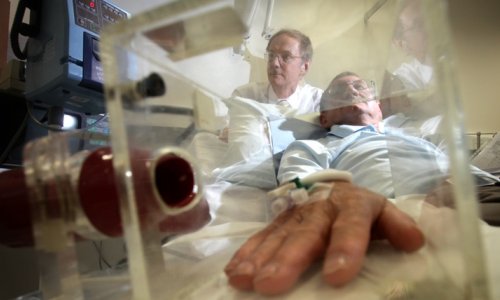Diabetes study does not confirm increased risk of death reported by US trial
Preliminary findings from the largest-ever study of treatments for diabetes provide no evidence that intensive treatment to lower blood glucose (sugar) increases risk of death.

Interim results from the ADVANCE Study, involving 11,140 high-risk patients with type 2 diabetes, provide no evidence of an increased risk of death among those patients receiving intensive treatment to lower blood glucose (sugar).
These findings contrast with those reported last week by the US National Heart Lung and Blood Institute suggesting that intensive glucose lowering treatment levels had increased the death rate among patients with diabetes recruited to the ACCORD trial.
ADVANCE was designed to answer two questions in patients with type 2 diabetes: first, does intensive treatment to lower blood pressure improve outcome; and second, does intensive treatment to reduce blood glucose improve outcome.
In September 2007, the ADVANCE Collaborative Group published evidence in The Lancet showing that the blood pressure lowering treatment had reduced the death rate among participants. In January 2008, the part of the study designed to assess the effects of the intensive treatment to reduce blood glucose was completed. As in ACCORD, this intensive treatment program was designed to lower blood glucose to levels below those usually recommended by clinical guidelines.
Chairman of the ADVANCE Data Monitoring and Safety Committee, Professor Rory Collins from the University of Oxford, said “The interim results from ADVANCE provide no confirmation of the adverse mortality trend reported from the ACCORD study.” He also noted that the ADVANCE interim results were based on more than twice as much data and similar levels of glucose control as in ACCORD. The members of the Data Monitoring and Safety Committee are the only members of ADVANCE study team with access to the study results.
ADVANCE principal investigator, Professor Stephen MacMahon from The George Institute for International Health in Sydney, stated that “Due to the unexpected report from the ACCORD trial, we felt it was in the public interest for us to ask our Data Monitoring and Safety Committee to make a statement as to whether the available data from ADVANCE provide any support for the suggestion that intensive blood glucose lowering may increase mortality.”
In ADVANCE, the intensive blood glucose lowering program aimed to reduce levels of haemoglobin A1c (a marker of long term blood glucose control) to below 6.5%. This treatment regimen included a sulfonylurea drug, gliclazide modified release, for all patients and a range of other drugs for those not reaching target blood glucose levels.
ADVANCE commenced in July 2001 and patients were treated and followed-up for an average of five years. The Data Monitoring and Safety Committee, comprising a panel of independent experts in the field, met every six months to review the study data for any safety issues or other concerns.
ADVANCE Management Committee Chairman, Professor John Chalmers, commented “Doctors and patients should feel reassured that the mortality trend reported by the ACCORD study has not been found in the interim results from ADVANCE. However, we need to await more definitive analyses and reports from both studies before drawing final conclusions”.
“Final patient visits have been completed, and the ADVANCE study data base is close to finalisation. We expect to have definitive results soon,” said Study Director, Dr Anushka Patel, from The George Institute. “At this stage, the Data Monitoring and Safety Committee have reviewed results that are more than 99% complete, so we are confident that the interim findings communicated here are a reliable guide to the final results”.
ADVANCE was conducted by an independent collaborative group of medical researchers, with support from the National Health & Medical Research Council of Australia and the Paris-based, Institute de Recherche Internationales Servier.
15.02.2007
More on the subject:





